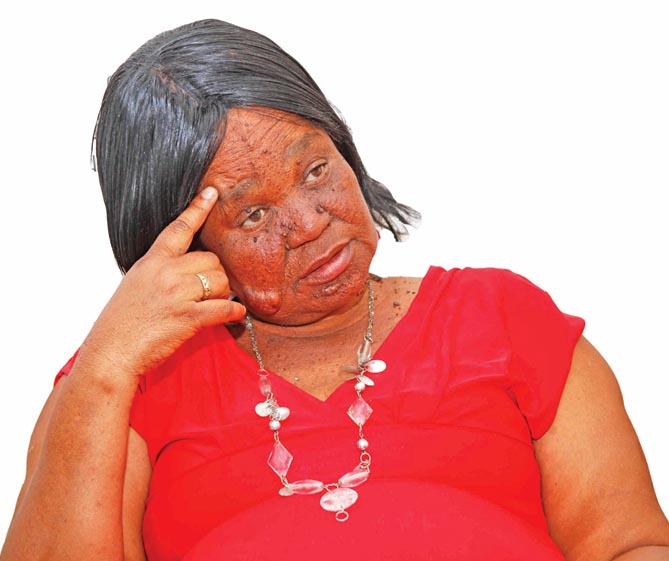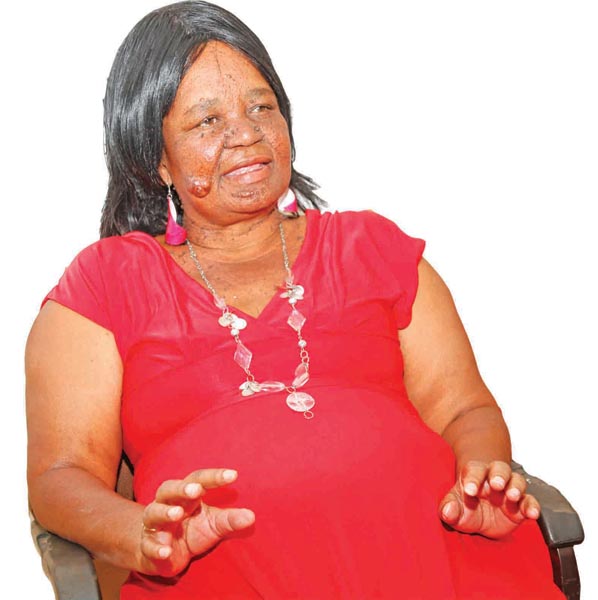A motherÔÇÖ endless nightmares
Source : Kutlwano
Author : Keonee kealeboga
Location : Gaborone
Event : Interview
Every woman thinks of motherhood in terms of the bliss that it is associated with. And with motherhood revolving around children, to most women the term is synonymous with bouncing and healthy offsprings.
However, for other women, the charm that usually accompanies motherhood is often a bit tainted with streaks of bitterness.
Lily Pelonomi of Mmathethe village in the Southern district is one woman for whom the mention of the term motherhood evokes a mixture of emotions.
While she, like most women, shed tears of joy, celebrating the birth of each of her four children, Lily’s tears later turned to those of anguish when two of her children turned out to have congenital abnormalities.
Her first three children grew up like any other child - bubbly, playful and full of life. However, as fate would have it, Lily began to worry when she began noticing that her second-born child had poor growth.
First, it struck her that her baby girl took too long to learn to walk and talk and when that persisted, “I got worried because it was becoming clear that something was seriously wrong with my child,” she tells Kutlwano in an interview.
As this marked the beginning of a long and frustrating journey for Lily, her first port of call was the local clinic. Although her child’s condition did not improve even after the clinic sojourn, the fact that the child was diagnosed as mentally retarded was instructive, to say the least.
Lily, a teacher at Maitlamo Primary School in Lobatse, would stop at nothing to get help for her daughter. She soon became a regular client of traditional doctors, traversing the length and breadth of Botswana.
“I don’t remember what I have not tried. I went from one traditional doctor to the next, and from church to church but still, my child’s condition did not improve,” she recalls with a lamenting voice.
As it appeared no help was forthcoming, gradually she lost hope of her daughter ever becoming normal again. Eventually, she shifted focus away from her child’s condition and moved on with life. After all, she had done all in her power to save her child, she reasoned.
The traditional doctors she consulted had told her all sorts of bizarre stories in futile efforts to explain her child’s condition, she says, adding that, at least modern medicine was able to diagnose her child’s condition.
Despite her mentally challenged child, Lily did in fact move on with life as there was nothing more she could do. “I tried for another baby and soon I welcomed another beautiful and bubbly baby girl into the world,” she says.
Unfortunately, upon reaching her teens, Lily’s mentally challenged daughter fell pregnant. She was aged 16, to be precise. Nevertheless, she was blessed with a beautiful baby girl.
Lily knew without being told that with the teenage mother’s mental state, the newborn child was her sole responsibility. In an attempt to ensure that the baby did not end up mentally-disturbed like its mother, she instructed and made sure that her daughter did not breastfeed the child.
Though the baby looked normal in many aspects, she noticed some minor abnormality. The baby’s other knee was disproportionately bigger, and upon medical examination, it was concluded that an operation would have to be carried out to correct the condition.
Although to Lily the problem was nothing compared to the burden that was the grandchild’s mentally challenged mother, she nonetheless feared that it was the beginning of another dark phase in her life,
Indeed it was as the operation turned out to be disastrous, and with hindsight, the apparently distraught mother-turned grandmother says had she known, she would not have consented to the operation.
What is telling, she says, is that the grandchild’s mental state became poorer following the operation, clearly worsening Lily’s misery. “It remains a mystery to date how a knee operation ended up affecting my grand-daughter’s faculties,” she wonders.
As it were, the grandchild started exhibiting the same behaviour that marked the onset of her mother’s mental illness. She was doing Standard Five when this happened,” she recalls.
“You can’t ever imagine the panic that hit me as I queried why this was happening to me? What evil had I done to deserve such a grave punishment?” asked the seemingly troubled Lily in an apparent self-pity.
While this flood of questions raced through her mind, she knew she had to do something. Perhaps with a twist of luck, this time around the heavens would smile upon her and her grand-daughter would be helped.
Once more her journey from hospital to church and to traditional doctors started in earnest. As it turned out, she says her trips were soon like a whirlwind. She was basically running around in circles with no success, whatsoever.
After all her attempts ended in vain yet again, she surrendered herself to fate - that her mentally disturbed granddaughter was also mentally ill, thus nothing could be done to help her.
There began the struggle of having to take care of two mentally challenged family members. Three years down the line, Lily was swept off her feet and she could not believe her luck when finally she was blessed with a baby boy, something she had long wished for.
Despite her obvious happiness, she says deep inside the thought of yet another bad luck striking her family tormented her the most. Her fears began to grow when the boy started crawling awkwardly, which baffled her.
“O ne a sa gogobe jaaka bana ba bangwe. O ne a gopa ka mpa, a etla a bidikama,” (instead of crawling on all fours the way babies do, her son crawled on his tummy, occasionally rolling over).
Learning to walk was no problem for the boy though. He walked when his time to walk came. However, when time to talk came, it became apparent that there was another problem as speech was not forthcoming.
When the speech therapy that doctors recommended did not work, Lily reasoned that there was no harm in consulting churches and traditional doctors, yet again! Modern medicine had failed her yet again, she reckons, justifying her relationship with traditional doctors and churches.
The circus started again. It was tale after tale, with each traditional doctor trying to outdo the other. It was because of what she was told during one session of divination that she decided to let go of all the “madness” and resign herself, once more, to fate.
The traditional doctor had told her that until and unless she underwent initiation to become a sangoma, her children would continue to be struck by unexplained mental illnesses.
“Not wanting anything to do with ancestral worship, I decided to leave matters to God.
I believe in God and there is no way I am going to become a sangoma. God knows the sorrow that I am going through because of these children and I know that one day he will do something about it,” hopes the ostensibly distressed Lily.
And as if she had not seen it all, a daughter of one of her normal children became blind while doing Standard Seven.
The girl had since childhood complained of severe headaches, and after doctors had operated on her, she went blind.
Because of the stigma associated with mental illness, Lily is now a worried woman particularly for their safety. Her mentally ill children often go out on their own and beg from strangers in malls, she laments.
“Batho bangwe ga ba na dipelo. Ba a ba betsa, ba ba tseela le madi fa ba ba tlhomogelang pelo ba ba latlheletse sengwenyana” (some heartless people become irritated and beat them up, or snatch the money they got from good Samaritans), mourns Lily.
She is also worried about some men who have the tendency of taking advantage of her children and abusing them sexually. “Just recently, one man took my mentally disturbed daughter and dumped her at the landfill, after abusing her,” she cries.
To add salt to injury, the four children’s fathers have all died, leaving Lily to struggle alone with the burden of raising children with disabilities on her own. The father of the three girls died while the youngest was still an infant, she says, adding that her son’s father also did not live long to see his son struggle through life.
And due to her ignorance of the policies relating to the education of such children, Lily did not send hers to school. It is only now that she is planning to send her son to Bothakga Primary School - a school in Lobatse that admits children with mental problems. Perhaps it would please Lily and soothe her aches were people to help her in any way possible to give her children a better life. She of course still nurses the hope that one day her children will be restored to normalcy.
Currently, the Lobatse Town Council is helping her mentally ill daughter with a food basket. Though she says this is not enough, it really helps and she appreciates it.
Though acknowledging that the school admits children with disabilities, Bothakga Primary School head, Khadija Pandor, however, highlights that they also admit normal children.
“We don’t admit those with disabilities only, even those considered normal are welcome in our school. The only difference is that those with disabilities have to be assessed first by a psychologist before enrolling with us,” explains Pandor.
With Bothakga, entry age is not a barrier to admission for children with disabilities. While those without any disabilities have to enroll at six years of age, those with disabilities are exempted.
“This is because in some cases, parents just keep their children at home without sending them to school, and when social workers come across them they bring them here so that they too can enjoy the benefits of going through the education system,” she states.
The school’s curriculum offers children who cannot benefit from academic work to learn life skills which in turn will help them not to be overly dependent on others for daily survival.
At the end of their stay at Bothakga, children with disabilities enroll with Camphill Rankoromane in Otse, another school that offers training for the disabled. “One of the problems that we face is that children who graduate from Rankoromane end up roaming the streets because some parents are not actively involved in the lives of their children.
We wish parents would do more to meet us halfway in improving the lives of these children,” she advised.
Teaser:
Just recently, one man took my mentally disturbed daughter and dumped her at the landfill, after possibly abusing her.














